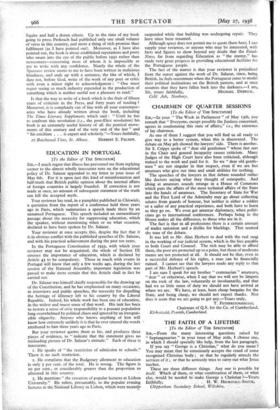EDUCATION IN PORTUGAL
[To the Editor of THE SPECTATOR]
much regret that illness has prevented me from replying sooner to the almost wholly inaccurate note on the educational policy of Dr. Salazar appended to my letter in your issue of May 6th. For it is upon just this kind of misinformation and half-truth that British public opinion about the internal affairs of foreign countries is largely founded. If correction is not made at once, no amount of subsequent statement of the truth can kill the accepted myth. _ Your reviewer has read, in a pamphlet published in Chiswick, a quotation from the report of a conference held three years ago in Paris, which sununarises a speech made there by an unnamed Portuguese. This speech included an extraordinary passage about the necessity for suppressing education, which • the speaker, without mentioning when or on what occasion, declared to have been spoken by Dr. Sala7nr.
Your reviewer at once accepts this, despite the fact that it is in obvious conflict with the published speeches of Dr. Salazar, and with his practical achievement during the past ten years.
In the Portuguese Constitution of 1933, with which your reviewer may not be acquainted, the whole of Section IX stresses the importance of education, which is declared by Article 43 to be compulsory. Those in touch with events in Portugal will know that only a few weeks ago, during the last session of the National Assembly, important legislation was passed to make more certain that this Article shall in fact be carried out.
Dr. Salazar was himself chiefly responsible for the drawing up of the Constitution, and he has emphasised on many occasions, in interviews and public speeches, the necessity for dispelling the heritage of illiteracy left to his country by the Liberal Republic. Indeed, his whole work has been one of education, in the widest and truest sense of that word. His task has been to restore a sense of civic responsibility to a peasant population long overwhelmed by political chaos and ignored by an irrespon- sible oligarchy. Anyone who knows anything of him will know how extremely unlikely it is that he ever uttered the words attributed to him three years ago in Paris.
But your reviewer quotes them as his, and produces three pieces of evidence, to "indicate that the statement gives no misleading picture of Dr. Salazar's attitude." Each of these is inaccurate.
1. He speaks of "the restriction of admission to schools." There is no such restriction.
2. He complains that the Budgetary allotment to education is only 5 per cent. of the total. He is wrong. The figure is to per cent., or considerably greater than the proportion so allocated in this country.
3. He mentions "the cessation of popular lectures at Lisbon University." He refers, presumably, to the popular evening lectures at the National Library in Lisbon, which were recently suspended while that building was undergoing repair. They have since been resumed. .
Although space does not permit me to quote them here, I can supply your reviewer, or anyone who may be interested, with facts and figures to show beyond any doubt that the Estado Novo, far from regarding Education as "the enemy," has made very great progress in providing educational facilities for the Portuguese people. • The fact of the matter is that your reviewer is prejudiced from the outset against the work of Dr. Salazar, since, being British, he feels resentment when the Portuguese cease to model their political institutions, on the British pattern, and at once assumes that they have fallen back into the darkness.—I am,


















































 Previous page
Previous page